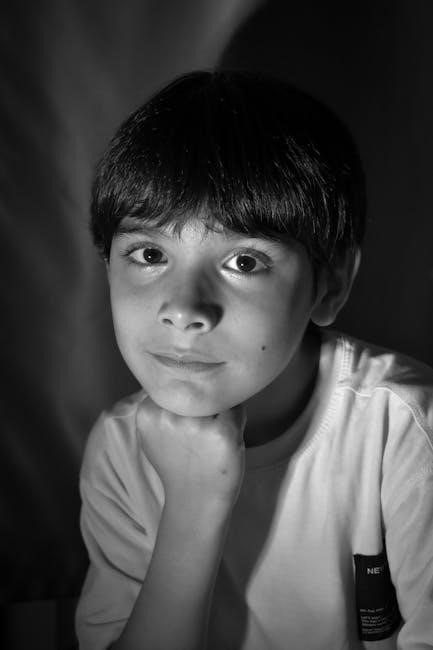Boy Erased is a powerful memoir by Garrard Conley, exploring themes of identity, faith, and family. The book recounts Conley’s experiences in conversion therapy, offering a poignant reflection on self-discovery and resilience, while its film adaptation amplifies its emotional depth and societal impact.
Overview of the Memoir
Boy Erased is a deeply personal and emotional memoir by Garrard Conley, recounting his experiences growing up in a conservative Baptist family in Arkansas. The book explores Conley’s struggle to reconcile his sexual identity with his faith and family expectations. After being outed to his parents, Conley is enrolled in a conversion therapy program called Love in Action, which aims to “cure” him of his homosexuality. The memoir vividly depicts the psychological and emotional toll of this traumatic experience, as well as Conley’s journey toward self-acceptance and liberation. Through raw and unflinching storytelling, Conley examines themes of identity, faith, and family, offering a poignant critique of conversion therapy and its devastating impact on LGBTQ+ individuals. The memoir has resonated widely, sparking important conversations about acceptance and human rights.
The Film Adaptation
The memoir Boy Erased was adapted into a film in 2018, directed by Joel Edgerton. The movie stars Lucas Hedges as Jared Eamons, a character based on Garrard Conley, alongside Nicole Kidman and Russell Crowe as his parents. The film follows Jared’s journey as he is forced into conversion therapy, highlighting the emotional and psychological struggles he faces. Edgerton’s adaptation stays true to the essence of Conley’s story, capturing the tension between faith, family, and identity. The film received critical acclaim for its powerful performances and sensitive portrayal of a controversial topic. It also sparked further discussions about the dangers of conversion therapy and the importance of LGBTQ+ rights. The adaptation has been praised for its ability to translate the memoir’s intimate and emotional depth into a visual narrative, making it a significant contribution to the ongoing conversation about identity and acceptance.

Garrard Conley: The Author
Garrard Conley, author of the New York Times bestselling memoir Boy Erased (2016), shares his harrowing experiences with identity and conversion therapy, inspiring a 2018 film adaptation and advocating for LGBTQ+ rights.
Background and Early Life
Garrard Conley grew up in a deeply conservative Baptist family in Arkansas, where his father served as a preacher. This upbringing shaped his early life, immersing him in a strict religious environment. Conley’s family adhered to traditional values, which often conflicted with his emerging identity. His journey began in a small town, where he struggled to reconcile his faith and sexuality. Conley’s experiences were further complicated when he was outed to his parents by his rapist during college, leading to intense familial and internal conflict. This pivotal moment set the stage for his enrollment in conversion therapy, a decision that would profoundly impact his life and later inspire his memoir, Boy Erased; Conley’s background is marked by resilience and a quest for self-acceptance, themes central to his story. His early life laid the foundation for his advocacy and writing career, offering a personal and powerful narrative of identity and faith.
His Journey and Advocacy
Garrard Conley’s journey from a conservative upbringing to becoming a prominent advocate for LGBTQ+ rights is deeply intertwined with his experiences of self-discovery and resilience. After enduring the trauma of conversion therapy, Conley emerged as a vocal critic of such practices, using his platform to raise awareness about their harm. His memoir, Boy Erased, became a catalyst for change, inspiring countless individuals to share their own stories and challenge oppressive systems. Conley’s advocacy extends beyond his writing; he actively supports LGBTQ+ communities, particularly those navigating religious and familial rejection. His work emphasizes the importance of acceptance and the need to dismantle harmful ideologies. Through his advocacy, Conley continues to inspire hope and foster understanding, proving that personal struggles can transform into powerful tools for societal change.

The Role of Family
The role of family in Garrard Conley’s life is central to his memoir, Boy Erased, as it explores the complexities of love, expectation, and conflict within a deeply religious household. Conley’s parents, particularly his Baptist preacher father, struggled to reconcile their faith with their son’s identity, leading to both emotional distance and a desire to “correct” his sexuality through conversion therapy. Despite the pain caused by these actions, Conley’s journey reveals a nuanced portrayal of family dynamics, highlighting the tension between unconditional love and rigid beliefs. The memoir underscores how family can both shape and challenge one’s sense of self, ultimately illustrating the resilience required to navigate such fraught relationships. Through this lens, Conley’s story becomes a universal exploration of the enduring yet complicated bonds of family.

The Memoir: “Boy Erased”
Boy Erased is a memoir by Garrard Conley that recounts his experiences growing up in a conservative Baptist family and undergoing conversion therapy. The book delves into themes of identity, faith, and family, offering a raw and intimate narrative of self-discovery and resilience. Conley’s journey from repression to acceptance is both deeply personal and universally relatable, making the memoir a powerful exploration of the challenges faced by LGBTQ+ individuals in religious communities. The book has received critical acclaim for its vivid storytelling and unflinching honesty, resonating with readers worldwide.
Themes: Identity and Belonging
Boy Erased delves deeply into themes of identity and belonging, chronicling Garrard Conley’s struggle to reconcile his sexual identity with his conservative Baptist upbringing. The memoir explores the internal conflict of being gay in a religious environment that rejects homosexuality, highlighting the pain of feeling disconnected from one’s family and community. Conley’s journey reflects the broader challenges faced by LGBTQ+ individuals in navigating societal expectations and finding self-acceptance. Through vivid storytelling, the book underscores the tension between faith and identity, revealing how Conley’s quest for belonging leads him to confront the harsh realities of rejection and the transformative power of self-acceptance. These themes resonate universally, making Boy Erased a poignant exploration of the human search for identity and acceptance in a world often marked by division and judgment.
Family Dynamics and Expectations
Boy Erased vividly portrays the complex family dynamics and expectations that shaped Garrard Conley’s life. Growing up in a fundamentalist Baptist household, Conley faced immense pressure to conform to his family’s religious and cultural norms. His father, a preacher, and his mother held traditional views on sexuality, which clashed with Conley’s emerging identity. The memoir explores the emotional toll of these expectations, particularly after Conley was outed by his rapist in college. His parents’ response—enrolling him in conversion therapy—highlighted the devastating consequences of their inability to accept his true self. The book reveals how family dynamics can both nurture and harm, creating a poignant narrative of love, betrayal, and the struggle for acceptance within one’s own family. This theme resonates deeply, illustrating the challenges of reconciling personal identity with familial expectations.

The Experience of Conversion Therapy
Boy Erased delves into Garrard Conley’s harrowing experience in conversion therapy, a program designed to “cure” homosexuality through religious indoctrination and psychological manipulation. Conley was enrolled in the Love in Action program, where he endured a rigid, 12-step regimen focused on erasing his gay identity. The therapy emphasized biblical teachings, labeling homosexuality as a sin and encouraging participants to adopt heterosexual behaviors. Conley faced intense emotional distress, feeling isolated and betrayed as he struggled to reconcile his true self with the program’s demands. The memoir vividly captures the trauma, shame, and internal conflict caused by these practices, highlighting the profound psychological toll of conversion therapy on individuals and their families. Conley’s account serves as a powerful indictment of such programs, exposing their harmful ideologies and practices.
Reception and Impact
Boy Erased has received widespread critical acclaim for its raw, unflinching portrayal of Garrard Conley’s experiences. The memoir became a New York Times bestseller and earned a Lambda Literary Award nomination, solidifying its place as a significant work in LGBTQ+ literature. The book’s emotional depth and Conley’s vivid storytelling resonated deeply with readers, sparking conversations about identity, faith, and the dangers of conversion therapy. Its impact extended beyond literature, as it played a key role in raising awareness about the harms of conversion therapy, contributing to advocacy efforts and policy changes. The memoir also inspired a major motion picture, further amplifying its message and reaching a broader audience; Conley’s courage in sharing his story has made Boy Erased a powerful symbol of resilience and a catalyst for change in the fight for LGBTQ+ rights. Its influence continues to grow, inspiring others to share their own stories of struggle and survival.

Conversion Therapy: A Closer Look
Conversion therapy aims to change sexual orientation, often through religious or psychological methods. The practice, as depicted in Boy Erased, is widely discredited and linked to lasting emotional harm.
What is Conversion Therapy?
Conversion therapy refers to practices aimed at changing an individual’s sexual orientation or gender identity, often through religious, psychological, or behavioral interventions. These methods, widely discredited by medical professionals, frequently involve techniques such as prayer, counseling, or aversive conditioning; The practice is rooted in the belief that being LGBTQ+ is a disorder or sin that needs correction. In Boy Erased, Garrard Conley recounts his experience in a 12-step conversion therapy program, highlighting its emotional and psychological toll. Such programs often lead to lasting trauma, self-shame, and mental health struggles. The memoir and film adaptation shed light on the harmful effects of conversion therapy, sparking widespread condemnation and advocacy for its ban. The practice remains a contentious issue, with many calling for greater awareness and legal action to protect vulnerable individuals.
Historical Context
Conversion therapy has its roots in early 20th-century psychological practices, often tied to religious ideologies. The concept gained traction in the mid-20th century, particularly in the U.S., as a way to “treat” homosexuality, which was then classified as a mental disorder. Many religious groups adopted these practices, blending psychology with biblical teachings to create programs aimed at changing sexual orientation. By the late 20th century, conversion therapy became increasingly associated with conservative religious movements, despite growing opposition from medical and psychological communities. The lack of scientific basis and the harm caused by these practices have led to widespread condemnation. Today, conversion therapy is banned in several states and countries, yet it persists in some religious circles. The historical context underscores the deeply ingrained societal biases that have fueled this practice, highlighting the need for continued advocacy and awareness.
Personal Stories and Impact
Garrard Conley’s memoir and its adaptation have profoundly impacted readers and viewers, shedding light on the traumatic effects of conversion therapy. His personal story resonates deeply, highlighting the emotional toll of being forced to reconcile sexual identity with religious beliefs. The raw honesty in Boy Erased has sparked crucial conversations about identity, faith, and family dynamics. Many have found solace in Conley’s journey, seeing reflections of their own struggles. The film adaptation further amplified this impact, reaching a broader audience and humanizing the experiences of those subjected to conversion therapy. The memoir and film have become powerful tools for advocacy, inspiring others to share their stories and fueling the fight against such harmful practices. Conley’s courage in recounting his pain has created a ripple effect, fostering empathy and understanding on a societal level.

The Film Adaptation: Insights
Boy Erased was adapted into a film in 2018, directed by Joel Edgerton, starring Lucas Hedges, Nicole Kidman, and Russell Crowe. The movie brings Garrard Conley’s memoir to life, capturing the emotional journey of self-discovery and the complexities of faith and identity. The film received critical acclaim for its powerful performances and thought-provoking narrative, resonating deeply with audiences and further amplifying the memoir’s message. It serves as a poignant reflection of the struggles faced by many in the LGBTQ+ community, offering a compelling cinematic experience that stays true to the original story’s essence.
From Book to Screen
The journey of Boy Erased from a deeply personal memoir to a major motion picture was a meticulous process. Director Joel Edgerton was moved by Garrard Conley’s story, seeing its potential to resonate universally. The film adaptation stayed true to the memoir’s core themes of identity, faith, and family, while also adding cinematic depth to enhance emotional impact. Lucas Hedges was cast as Jared Eamons, embodying the complexity and vulnerability of Conley’s character. Nicole Kidman and Russell Crowe portrayed Jared’s parents, bringing nuance to their roles as loving yet conflicted figures. The screenplay carefully condensed the memoir’s intricate narrative, ensuring key moments were preserved while adapting the story for visual storytelling. The result was a film that honored the original work while expanding its reach to a broader audience, maintaining the authenticity that made the memoir so compelling.

Director Joel Edgerton’s Vision
Joel Edgerton brought a profound sensitivity and urgency to adapting Boy Erased for the screen. Drawn to Garrard Conley’s memoir, he sought to honor its emotional depth while expanding its reach. Edgerton balanced the film’s intensity with a nuanced exploration of family dynamics, ensuring the story remained personal yet universally relatable. His vision emphasized Jared’s internal struggle, using subtle performances and evocative visuals to convey the weight of identity and faith. By casting actors like Lucas Hedges, Nicole Kidman, and Russell Crowe, Edgerton enriched the narrative with layered portrayals. His approach highlighted the memoir’s core themes, creating a cinematic experience that resonated deeply with audiences and critics alike, solidifying Boy Erased as a powerful exploration of self-discovery and acceptance.
The Cast and Their Roles
The film adaptation of Boy Erased features a stellar cast that brings Garrard Conley’s story to life with profound emotional depth. Lucas Hedges portrays Jared Eamons, the protagonist, capturing his journey of self-discovery and struggle with identity. Nicole Kidman plays Jared’s mother, Nancy, embodying the complexity of a loving parent grappling with her son’s truth. Russell Crowe stars as Marshal Eamons, Jared’s father, whose rigid beliefs create tension while revealing a deeper desire to connect. The cast’s nuanced performances highlight the emotional layers of the story, drawing audiences into Jared’s world. Their portrayals not only honor the memoir but also amplify its message of acceptance and resilience, making the film a compelling and relatable experience for viewers. The chemistry between the actors underscores the film’s emotional core, ensuring its impact lingers long after the credits roll.
Reception and Reviews
The memoir Boy Erased received widespread critical acclaim for its raw honesty and emotional depth. Reviewers praised Garrard Conley’s courage in sharing his personal struggles with identity and faith. The book became a New York Times bestseller, resonating with readers for its universal themes of self-discovery and acceptance. Similarly, the film adaptation was met with positive reviews, with critics highlighting the powerful performances of the cast, particularly Lucas Hedges, Nicole Kidman, and Russell Crowe. The movie holds a high rating on platforms like Rotten Tomatoes, with many praising its thoughtful portrayal of a sensitive subject. Audiences and critics alike commended the story’s ability to evoke empathy and spark important conversations about identity, family, and societal expectations. Both the memoir and the film have left a lasting impact, earning their places as significant cultural contributions to the LGBTQ+ narrative.
Comparisons Between Book and Film
While the film adaptation of Boy Erased remains largely faithful to Garrard Conley’s memoir, there are notable differences in storytelling and focus. The book provides a more introspective and detailed account of Conley’s experiences, delving deeply into his emotional and psychological struggles. The film, directed by Joel Edgerton, condenses the narrative, focusing on key moments such as Conley’s enrollment in conversion therapy and his complex relationship with his parents. Both mediums emphasize themes of identity, faith, and family, but the film relies more on visual storytelling and performances to convey these elements. Lucas Hedges’ portrayal of Jared Eamons (a fictionalized version of Conley) captures the character’s internal conflict, while Nicole Kidman and Russell Crowe bring depth to the roles of his parents. Overall, the book and film complement each other, offering unique perspectives on Conley’s journey, with the memoir providing a richer, more personal exploration of his story.

Public Reception and Impact
Boy Erased received widespread acclaim for its raw portrayal of identity and resilience. The memoir became a New York Times bestseller, and the film, starring Nicole Kidman and Lucas Hedges, earned critical praise for its emotional depth and societal relevance.
Critical Acclaim and Reviews
Boy Erased received widespread critical acclaim for its powerful storytelling and emotional depth. The memoir was praised for its raw honesty and thought-provoking exploration of identity, faith, and family. Critics highlighted Garrard Conley’s vivid prose and his ability to convey the complexity of his experiences. The film adaptation, directed by Joel Edgerton, also garnered positive reviews, with performances by Lucas Hedges, Nicole Kidman, and Russell Crowe earning particular praise. Many noted the film’s sensitive portrayal of the challenges faced by LGBTQ+ individuals and the harmful effects of conversion therapy. Both the book and the film were celebrated for their ability to spark important conversations about acceptance and resilience; The memoir became a New York Times bestseller, further cementing its impact on contemporary literature and culture.
Awards and Recognition
Boy Erased has garnered significant awards and recognition for both the memoir and its film adaptation. The memoir, published in 2016, was nominated for a Lambda Literary Award, acknowledging its contribution to LGBTQ+ literature. The book also became a New York Times bestseller, solidifying its impact on readers nationwide. The film adaptation, released in 2018, earned numerous accolades, including Academy Award buzz and critical acclaim at film festivals. Lucas Hedges received a Golden Globe nomination for his portrayal of Jared Eamons, while Nicole Kidman and Russell Crowe were praised for their performances. The film’s success highlighted the importance of storytelling in shedding light on the injustices of conversion therapy, further amplifying its message of hope and resilience. These recognitions underscore the profound influence of Boy Erased on both literary and cinematic landscapes.
Influence on LGBTQ+ Rights
Boy Erased has become a pivotal voice in the fight against conversion therapy and for LGBTQ+ rights. The memoir and film have raised awareness about the harmful effects of conversion therapy, inspiring widespread conversations and advocacy. Garrard Conley’s story has humanized the broader issue, resonating with audiences and encouraging empathy. The film’s release in 2018 coincided with growing protests against conversion therapy, with many crediting it for amplifying the movement. Conley has since become a prominent advocate, collaborating with organizations to push for bans on conversion therapy. The story’s emotional depth has motivated many to support LGBTQ+ rights, fostering a cultural shift. By sharing his journey, Conley has empowered others to speak out, leaving a lasting impact on the fight for equality and justice. Boy Erased continues to be a powerful tool in the ongoing struggle for LGBTQ+ rights and acceptance.
Boy Erased leaves a lasting legacy as a testament to resilience and the fight for authenticity. Its powerful storytelling continues to inspire advocacy for LGBTQ+ rights and understanding, fostering meaningful dialogue and change.

The Memoir’s Lasting Impact
Boy Erased has left an indelible mark on literature and society. Garrard Conley’s courageous storytelling has sparked crucial conversations about identity, faith, and acceptance. The memoir’s raw honesty resonates deeply, humanizing the LGBTQ+ experience and challenging societal norms. Its adaptation into a film further amplified its reach, bringing Conley’s journey to a broader audience. The book has become a beacon for advocacy, inspiring countless individuals to embrace their authenticity and fight for equality; By sharing his struggles and triumphs, Conley has created a legacy that continues to empower and educate, fostering empathy and understanding. Boy Erased remains a vital narrative in the ongoing struggle for LGBTQ+ rights, proving the power of personal stories to drive change and heal wounds.
Cultural and Social Influence
Boy Erased has profoundly influenced cultural and social discourse, particularly in its portrayal of conversion therapy and its impact on individuals and families. By shedding light on the often hidden experiences of LGBTQ+ individuals, the memoir and its film adaptation have sparked widespread conversations about acceptance and human rights. The story has resonated across generations, inspiring many to reflect on their own beliefs and values. Its influence extends beyond entertainment, contributing to legislative efforts to ban conversion therapy in several regions. Garrard Conley’s work has also fostered a greater understanding of the complexities of faith and identity, encouraging a more inclusive dialogue within religious communities. Through its unflinching honesty, Boy Erased continues to challenge societal norms, leaving a lasting impact on both culture and social justice movements.
